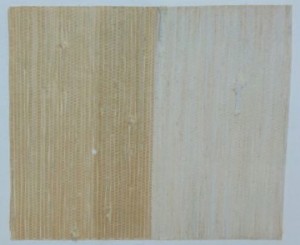Grasscloth wall coverings are made of natural plant fibers and offer a warm, inviting and textured look to a room. However, grasscloth has one major drawback: the fibers oxidize, especially when exposed to sunlight. So, if you were in love with the color you originally selected for your wall covering, you may be disappointed to see it change color quite rapidly. What can be done to correct this pesky problem?
Recently, a client called on Painting in Partnership, a painting and decorating contractor from the Chicago area, to address that same issue. The original color of the grasscloth was a light cream color, which matched his monochromatic surroundings. Within a few months, the wallpaper started to take on yellow and gold tones, as shown on the far left of sample on.
Considering the fact that the client had twelve hundred square feet of that wall covering installed only a year earlier, removal was not an option. Therefore, we devised a method to restore the look of his original wallpaper. As a first step, we used a dead-flat waterborne varnish to first seal the grasscloth and also stop any future oxidization, as shown in the middle stripe in the picture. We then experimented with different densities of a transparent waterborne cream glaze to help bring back the original tones, without making it look like the paper had been painted over (see stripe on right). The treatment still allowed the original irregularities in color to continue to show through the glaze. The client was delighted!
Can you prevent oxidization from occurring on your freshly installed grasscloth? Yes indeed! Once installed, the paper can be coated with the same dead-flat varnish.








 Follow
Follow
